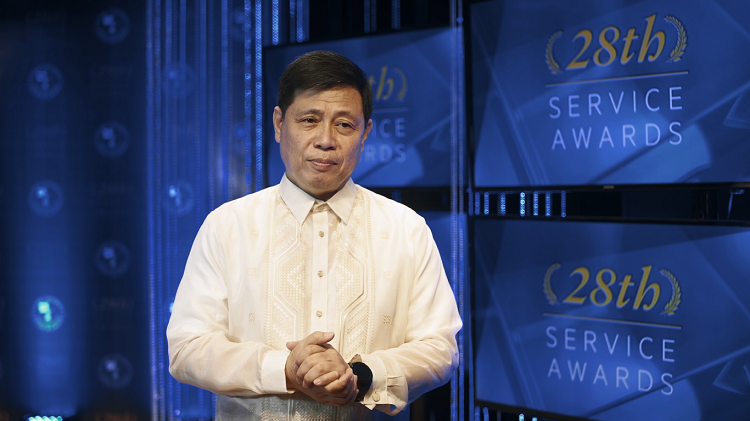
Address at the 28th Service Awards and Retirement Recognition Ceremony
Fr Mars P Tan SJ
28th University Service Awards
January 27, 2021
My dear fellow employees here at Xavier Ateneo, especially our beloved service awardees and retirees, my warmest congratulations to all of you and I wish to thank all of you for your dedicated and generous service to Xavier Ateneo and to its vision and mission, your loyalty to what Xavier Ateneo stands for, and for your sacrifices amidst all the difficulties and challenges that Xavier Ateneo has been going through especially during this time of the pandemic.
Your combined number of years of service is 268 years! Imagine, two centuries and a half, which is quite a looong time! Of course, your individual’s years of service and the combined number of years of generous service to the university particularly to many generations of students from all departments, schools, and colleges should not just be quantified in numbers. More than that are the total effects which we see and experience in what Xavier Ateneo is now and in what our students and alumni have become in the present.
What is service in a Jesuit institution?
Service in Christian spirituality is understood as the work of love. It is the essential partner of prayer, and both (prayer and service) form the wholeness of the true Christian life.
Our 28th Service Awards and Retirement Recognition Ceremony today to honor and thank our service awardees and retirees understands service in that context of love, in particular the love of God, which from the beginning of our lives has enabled us to love and serve one another in return.
One charism of Ignatian spirituality is aptly captured in this key phrase of the Spiritual Exercises, “to love and to serve in all things” In Spanish, it is “en todo y amar et server”. Every retreatant, at the end of his/her, retreat should beg the Lord for this grace – that he or she will be able to love and to serve God in all things. This Ignatian phrase was made into a beautiful song, entitled, Amare et Servire, by Fr Manoling Francisco, SJ. Every time we sing the song we also pray to God to empower us love and to serve in all things.
In this particular understanding of service, it is clear that service is focused on work or deed done for the love of others. In the context of work in the university, the love component is not necessarily a positive dramatic feeling towards your students, fellow workers, the unit head or director, or even the president. Love here is expressed in your daily commitment to fulfill the work as best as you could because it’s the right thing to do and the proper way to grow and develop as a human person. Again, service here is primarily about work or ministry motivated and nourished by love beyond the self.
In the article of Fr David Fleming, SJ, titled, “Here I Am, Ignatian Ways of Serving”, he enumerates different “ways of serving” based on his review and study of the Autobiography of St Ignatius. One way of serving he highlighted based on Ignatius’s growing understanding and practicing of service is that to serve is to be in a relationship with others. It is to serve as a group of people related to one another bonded by a common aim or purpose. For us Jesuits, this is the root foundation of our being companions of Jesus, the Company of Jesus, la Compania de Jesus. We may work individually and most Jesuits are very independent and would prefer to be left to work on their own but the practice of service of every Jesuit is always within and for the company’s common vision and mission. Ignatian service historically is people working together because there is only one aim of service – God’s greater glory.
In the context of the university, this is also true. Service is always aimed at fulfilling the vision and mission of the university with others and for others. Whatever kind of work, teaching, answering phone calls, encoding, attending meetings, managing conflicts, checking test papers, video recording, sweeping the floors, counting money, and many others which contribute to the fulfillment of the mission is service in itself. That is why service is to be in relationship with others because the vision and mission are shared also by many and not to be fulfilled by only one person. Further, service is always aimed at fulfilling something larger than one’s self, one’s interest, and one’s agenda. Why is this so? It’s because service originates from love – love is not limited to the self alone and is never self-serving.
What is the sum total effect of service? Every work of love produces something good and over many years this becomes so big and complex that it’s hard to describe it adequately in words. Truly, every annual service and retirement recognition ceremony allows us to see ourselves intimately connected to the institution we serve not just because of the years of service we’ve rendered but because of what has become to the institution and to the people to whom and with whom we have given our lives. That connection is profoundly deep and beautiful because it has been watered every day with the labor of love; I know, working was not exciting and happy all the time, in fact, you did not experience love that way many times, but in the daily acts of sacrifice to remain true to the commitment you took as a teacher, a staff or an administrator. I know that given this pandemic and other limitations, this connection may not be physically sustained several years from now by you or by Xavier University. But that connection cannot be changed and will remain etched in the history of Xavier University and in the life story of every student and alumnus you’ve encountered and whose life you’ve touched. Especially to our dear retirees, that while you are about to leave this university and recreate yourself in a new environment, you are always free to say, “I was once part of Xavier Ateneo and I will forever be part of its memorable history and the continuing stories of the lives of students and personnel there”.
In St Ignatius’s pre-note of two points in this particular Exercise, Contemplation to Obtain the Love of God, he says in his first point that love is shown more in deeds than in words; and in his second point, that people in love should share with others what they have. Clearly, service is an expression of love and the person who serves personifies love. To love and to serve is to fulfill who we really are, to put into effect our essence as children of God, whatever denominations or religions we belong to.
To summarize:
- Service is mainly about work or deed that we do to express our love for God and for others. This work does not have to be big and spectacular. Being helpful to someone in need is a service in itself.
- But service is not just about work, it is also about relationships because we serve as one community, as one family, as one society to contribute to fulfilling a common mission that is larger than ourselves.
- The sum total effect of service is the mission accomplished or the nearing to completion of the mission.
- To love and to serve is to fulfill ourselves as to who we are (our nature) and what we are capable of doing (our capabilities and potentials) as children of our Father in heaven.
That is why my dear retirees and awardees, I thank you all, on behalf of the whole university, for all that you’ve done, for all the love, and for the relationships you’ve helped formed in this institution toward the mission that is Xavier Ateneo. My fervent prayer is that your stay and work at Xavier Ateneo would form you to be more loving and serving persons for God and for others.

My warmest congratulations to all of you! Again, my heartfelt gratitude to our retirees for making XA what it is now, and my challenge to the awardees to carry on, together we will surmount problems along the way and emerge triumphant in the end! AMDG!